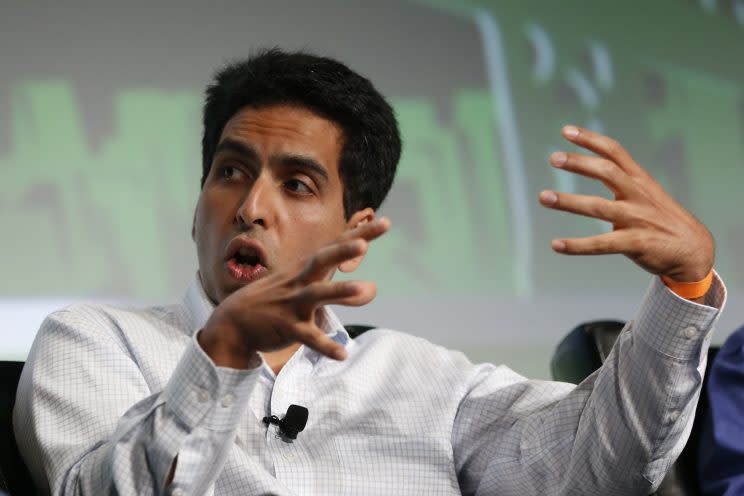Free SAT prep aims to level the playing field for college admissions

Josh Sims, a student at Creative Arts Morgan Village Academy, a magnet school in Camden, N.J., wasn’t content with his PSAT score: 1020 out of 1600.
The teen signed up for a new free online SAT training course. After studying videos on math and reading comprehension and taking practice tests, he took the SAT three times. In November, he got the highest score in his school district — 1320.
“It is the most efficient program for studying for the SAT. It’s like having a personalized gym that you can go to if you want,” he told Yahoo News. “Basically, you just keep working on your weaknesses. That’s what I love about it the most. It tells you your weaknesses and you keep working on your weaknesses so that they become strengths.”
Sims was accepted into Cornell University for the fall and hopes to follow it with Harvard Law.
The College Board redesigned the SAT college entrance exam a few years ago and partnered with Khan Academy to provide free, personalized test prep for all students, partly to counteract the unfairness of expensive test prep courses — such as the Princeton Review — that benefit students from wealthier school districts.
The Khan Academy is a nonprofit that offers free educational videos and supplementary practice materials online. Retired hedge fund analyst Salman “Sal” Khan founded the educational organization in 2006. It’s primarily funded through donations from philanthropic organizations.
Though Sims’ success with the program is extraordinary, the College Board recently released data that shows significant improvements for most students who used the new Khan Academy program to improve their SAT scores.

Others achieved remarkable results as well. Matthew Blue, of Houston, Texas, improved his score by more than 200 points. D’Andre Weaver, of Orlando, Fla., increased his score by 260 points. And Omaria Murray-Broadwater, of Columbia, SC., improved her SAT score by 340 points.
“For a lot of programs, normally you have to pay for tutors. With Khan Academy, they have people that train you for free. So take advantage of it,” Murray-Broadwater said.
The College Board-Khan Academy analysis, which looked at nearly 250,000 students from the class of 2017 who took the PSAT and SAT within the past year, shows that 20 hours of practice with the program was associated with an average increase of 115 points from the PSAT to the SAT. That’s nearly double the increase experienced by students who did not enroll in the program.
Shorter practice times were associated with smaller gains. More than 16,000 SAT students improved their scores from the PSAT to the SAT by at least 200 points. And according to researchers, these improvements were consistent across various groups, including gender, ethnicity, socioeconomic class and high school GPA.
David Coleman, the president and CEO of the College Board, said that for too long people have viewed standardized tests as a sentence: something that tells you who you are rather than who you could be through practice.
“It was never a good idea that there was this one high-stakes moment that defines your future and could fill you with anxiety,” Coleman told Yahoo News.
The old SAT was largely an aptitude test, but the new SAT — introduced in March 2016 — measures straightforward reading, writing and math skills that can improve with practice. Coleman said the obscure SAT words and math problems have been replaced with questions one would reasonably confront in high school or college. The new exam also removes the guessing penalty for wrong answers.

The PSAT should no longer be seen as a “practice test” but as the “beginning of practice” — calling attention to places where students can improve.
Khan, who is also the chief executive officer of the Khan Academy, said the new test prep teaches students to fill gaps in their knowledge rather than learn tricks for strategic guessing when stumped by a difficult question.
“The SAT is not a measure of IQ. It’s a measure of how well they can grasp the basic stuff in the first few years of high school. It’s a measure of college readiness,” Khan told Yahoo News.
Khan said the PSAT is now the country’s “largest personalized learning diagnostic” and that the Khan Academy’s software can help with “weak-point training.”
“You can follow these students over two years in a longitudinal way that you really couldn’t do before,” he said.
According to Coleman, the whole SAT revamp stems from a democratic impulse that the test should not be about “what you have” but about “the dedication you show through practice.”
“The data show that practice is an equal opportunity employer, that across income groups, across race, it advances you. We’re seeing students of all races and backgrounds devoting themselves to it,” he said.

Robert Schaeffer, the public education director at FairTest, the National Center for Fair & Open Testing, advocates for replacing the SAT, ACT and similar tests with test-optional college admissions. He’s long been critical of claims that coaching for these sorts of standardized tests is not possible.
“If the SAT were not coachable, it would be about the only human endeavor that is not,” Schaeffer told Yahoo News. “When getting one question right or wrong is about 10 points, you don’t need a lot more questions right to go up about 100 or more.”
For this reason, he said, wealthy parents buy their children a leg up on the competition by signing them up for test-prep programs offered by Kaplan or the Princeton Review.
“Grab a local Yellow Pages and look at the addresses of where coaching centers were located. In New York City, they’re going to be on the Upper West Side and Scarsdale-type suburbs,” Schaeffer said. “They don’t tend to be in central Harlem or other low-income areas. It’s not because the coaching companies are racist. They only care about one color, and it’s green: They go where the money is.”
Schaeffer is skeptical of claims that the latest revision of the SAT will make it a fairer or more accurate tool, though he said improvements have been made. (He thinks the test was revamped to make the test more consumer-friendly after the ACT overtook the SAT as the nation’s most popular college admissions exam in 2012, for the first time in its history.)
Coleman and Khan don’t merely want the new testing program to have a democratizing effect — they also want it to encourage the sort of learning habits that enable grownups to sink or swim in today’s accelerating market.
“We’re really trying to turn the SAT and the PSAT into an invitation to practice, into an inspiration as it were. A challenge that changes you rather than a challenge that defines you.”
Citing a column by Tom Friedman in the New York Times, Coleman said all people need to own their future in our rapidly changing society — whoever they are. Jobs and the economy are changing rapidly, and one will need to continually refresh his or her skills and education in order to keep up, he said.
“I want the new SAT to become a symbol to the people that through practice they can take command of their lives. They can become something different from who they are,” he said. “I think that’s the big idea here.”
Read more from Yahoo News:



